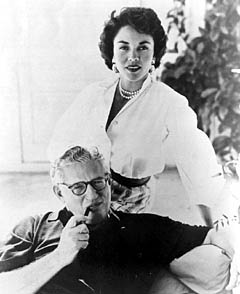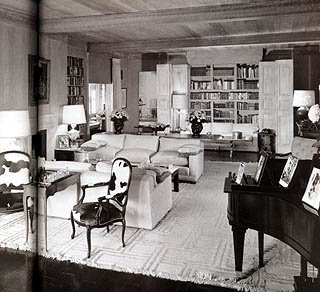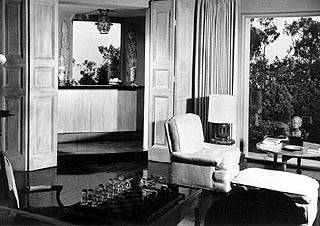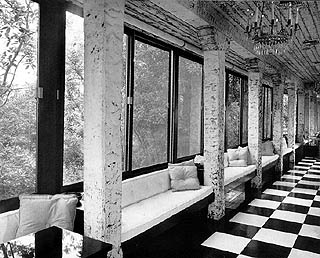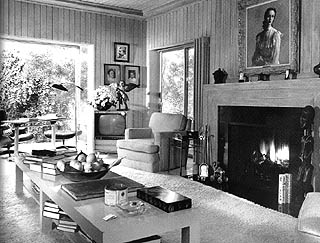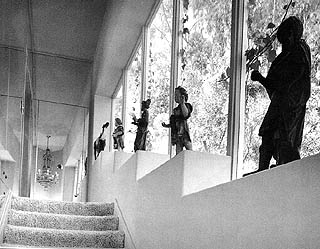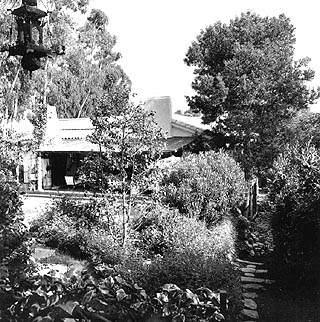Jennifer Jones and David O. Selznick at Tower Grove
by Anne Edwards
(Architectural Digest, April, 1992)
(Note: The author incorrectly states that Jones was signed by Selznick in 1940 instead of 1941 and she also adds an extra "L" to Phylis)
by Anne Edwards
(Architectural Digest, April, 1992)
(Note: The author incorrectly states that Jones was signed by Selznick in 1940 instead of 1941 and she also adds an extra "L" to Phylis)
In one of the thousands of memos written by David O. Selznick to his staff, he protests, "The figures on Phyllis Walker are in my opinion slightly insane. Here is a girl who has done nothing, or next to nothing, and we think of starting her at $200 (a week)... We have been thrown way out of line by such exorbitant figures as we paid to Vivien Leigh and Ingrid Bergman at the time we signed them. Let's get down to earth." Four weeks later he had changed his tune. "I think we have enough enthusiasm for her now to believe that we will give her an important lead."
Following the fictional pattern of one of his earlier movies, A Star Is Born (1937), he placed her under personal contract in 1940 and asked his publicity director to find her a new name, adding, "I don't want anything too fancy, and I would like to get at least a first name that isn't also carried by a dozen other girls in Hollywood."
Phyllis (Isley) Walker was thus rechristened Jennifer Jones. She was living in New York, working in radio and theater, married to a struggling young actor named Robert Walker and the mother of two small sons.
Even in that select and "much-abused and sadly vanishing" group (as he was to call his peers, Hollywood's independent creative producers), David O. Selznick stood out as a titan. He produced the most popular film of all time, Gone With The Wind, and Rebecca (which won Best Picture Academy Awards for 1939 and 1940 respectively), and his name above a movie's title was in itself a box-office draw. The films he made during his lustrous Sleznick International years created an impressive list that included the fabulous Oscar-winning duo previously mentioned. Four other Sleznick enterprises were nominated for Best Picture - Viva Villa! (1934), A Tale of Two Cities (1935), A Star Is Born (1937) and Spellbound (1945).
Following the fictional pattern of one of his earlier movies, A Star Is Born (1937), he placed her under personal contract in 1940 and asked his publicity director to find her a new name, adding, "I don't want anything too fancy, and I would like to get at least a first name that isn't also carried by a dozen other girls in Hollywood."
Phyllis (Isley) Walker was thus rechristened Jennifer Jones. She was living in New York, working in radio and theater, married to a struggling young actor named Robert Walker and the mother of two small sons.
Even in that select and "much-abused and sadly vanishing" group (as he was to call his peers, Hollywood's independent creative producers), David O. Selznick stood out as a titan. He produced the most popular film of all time, Gone With The Wind, and Rebecca (which won Best Picture Academy Awards for 1939 and 1940 respectively), and his name above a movie's title was in itself a box-office draw. The films he made during his lustrous Sleznick International years created an impressive list that included the fabulous Oscar-winning duo previously mentioned. Four other Sleznick enterprises were nominated for Best Picture - Viva Villa! (1934), A Tale of Two Cities (1935), A Star Is Born (1937) and Spellbound (1945).
Even in that select and "much-abused and sadly vanishing" group (as he was to call his peers, Hollywood's independent creative producers), David O. Selznick stood out as a titan. He produced the most popular film of all time, Gone With The Wind, and Rebecca (which won Best Picture Academy Awards for 1939 and 1940 respectively), and his name above a movie's title was in itself a box-office draw. The films he made during his lustrous Sleznick International years created an impressive list that included the fabulous Oscar-winning duo previously mentioned. Four other Sleznick enterprises were nominated for Best Picture - Viva Villa! (1934), A Tale of Two Cities (1935), A Star Is Born (1937) and Spellbound (1945).
By virtue of his grooming and good judgment, his films had made international celebrities of Ingrid Bergman, Vivien Leigh and Joan Fontaine. He was determined that Jennifer Jones have the same stellar renown. Three years after he had signed her, Selznick finally agreed to loan out his most recent discovery to Fox for the lead in The Song of Bernadette (1943), which he believed would (and which indeed did) bring her immediate success. Her second film, 1944's Since You Went Away, was for David O. Selznick Productions. By then Robert Walker was embarked on his own career, and Sleznick cast him opposite Jones. At the end of production, Selznick and Jones were in love, and after divorcing their mates, they were married in 1949, having also made Duel in the Sun (1946) and Portrait of Jennie (1948) together.
By virtue of his grooming and good judgment, his films had made international celebrities of Ingrid Bergman, Vivien Leigh and Joan Fontaine. He was determined that Jennifer Jones have the same stellar renown. Three years after he had signed her, Selznick finally agreed to loan out his most recent discovery to Fox for the lead in The Song of Bernadette (1943), which he believed would (and which indeed did) bring her immediate success. Her second film, 1944's Since You Went Away, was for David O. Selznick Productions. By then Robert Walker was embarked on his own career, and Sleznick cast him opposite Jones. At the end of production, Selznick and Jones were in love, and after divorcing their mates, they were married in 1949, having also made Duel in the Sun (1946) and Portrait of Jennie (1948) together.
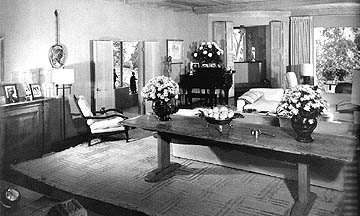
Selznick had "a kind of innocence," John Huston once reflected. "Like all boys, he loved to play games, and there was a quality of game-playing in everything he did. He loved to dress up and entertain, to play the host. He was kind of high and handsome; he couldn't do enough for his guests." ABOVE: The country trestle table adds a rustic feel to the multiwindowed living room.
Exhausted by twenty years of film producing, Selznick took Jones off to Europe, and their careers shifted into international gear during the next few years. He astutely traded off some of the foreign rights of his former pictures and acquired Western Hemisphere rights to several European ventures, the very first being The Fallen Idol (1948). Then, with the same partners, Sir Alexander Korda and Sir Carol Reed, he coproduced The Third Man (1949), contributing to the film's screenplay. And, with Jones as star, he The Wild Heart (1952) and Indiscretion of an American Housewife (1954).
When they returned to Los Angles they bought a comfortable old Spanish colonial-style house on a thickly wooded hillside in Benedict Canyon. With the addiction of vast floor-to-ceiling windows, the natural beauty of their surroundings became an integral part of the decor. To this ambiance they brought their own unique tastes. Tower Grove quickly became a full collaboration between husband and wife.
When they returned to Los Angles they bought a comfortable old Spanish colonial-style house on a thickly wooded hillside in Benedict Canyon. With the addiction of vast floor-to-ceiling windows, the natural beauty of their surroundings became an integral part of the decor. To this ambiance they brought their own unique tastes. Tower Grove quickly became a full collaboration between husband and wife.
Jennifer Jones's former home was "a magical place," she remembers. "It was filled with marvelous ghosts. The house was once owned by John Gilbert, and there were legendary stories about his getting wildly drunk and standing stark naked in the patio off the bar and shouting dramatically to guest approaching from below." It had also been occupied by Greta Garbo. Selznick had purchased if from Miriam Hopkins.
Much of the couple's entertaining was done outside on the handsome grounds, which had a swimming pool and a tennis court. Shaded terraces provided a cool oasis for observing the California hills, but Selznick, great showman that he was, could not help attempting to improve upon the scenery when he could.
Elia Kazan recalled a time when he drove to Tower Grove to see Selznick. A maid asked him to wait while he was announced. Kazan could hear the woman inform his host, who was on the patio, of his arrival. "Oh yes, yes. Show him in," Selznick replied, and then added: "No, wait a minute. Turn on the fountain first."
Increasingly, Jones's career became the focus of her husband's life. She was now a great star, the recipient of one Academy Award and several nominations. Selznick wanted her to appear in critically and financially successful films that would further bolster her prestige, and to this aim he sought classic stories with strong women's roles to offer the best opportunities.
Much of the couple's entertaining was done outside on the handsome grounds, which had a swimming pool and a tennis court. Shaded terraces provided a cool oasis for observing the California hills, but Selznick, great showman that he was, could not help attempting to improve upon the scenery when he could.
Elia Kazan recalled a time when he drove to Tower Grove to see Selznick. A maid asked him to wait while he was announced. Kazan could hear the woman inform his host, who was on the patio, of his arrival. "Oh yes, yes. Show him in," Selznick replied, and then added: "No, wait a minute. Turn on the fountain first."
Increasingly, Jones's career became the focus of her husband's life. She was now a great star, the recipient of one Academy Award and several nominations. Selznick wanted her to appear in critically and financially successful films that would further bolster her prestige, and to this aim he sought classic stories with strong women's roles to offer the best opportunities.
She had been scheduled to star in the screen adaptation of Clifford Odes's play The Country Girl when she became pregnant. Selznick believed so strongly that Jones could win a second Academy Award that he tried to convince on the film's producers, William Perlberg, to move quickly into production before her condition was evident. Perlberg and his partner, George Seaton, refused to go before the cameras on such short notice,a nd Jennifer Jones was replaced by Grace Kelly.
It had long been Selznick's dream to film F. Scott Fitzgerald's Tender Is The Night, for the Jazz Age's most famous author had been a favorite of his. But fearing he might not have enough perspective to serve as the producer of a film staring his wife, he sold Twentieth Century-Fox the package, which included the rights to Tender Is The Night and Jennifer Jones's services as star in the role of Nicole Diver. It was an act that he was always to regret, for he felt they ruined the film by not taking his advice.
Selznick's deep disappointment in the poor reception for Tender Is The Night (1961) had a devastating effect on him, and he took great offense. After the rebuff, he felt his own civilization had passed, that showmanship and creativity had gone from the industry he helped shape and loved so dearly. He never made another film and died at the age of sixty-three.
Selznick often said that only time could tell what films truly deserved an award for Best Picture. By such a measure he remains a giant, for who, having seen them, could ever forget Rebecca, King Kong (1933), Reckless (1935), Anna Karenina (1935), A Star Is Born (1937) or The Garden of Allah (1936) - a few of his films - to say nothing of the stars he helped immortalize. His name still conjures up towering images of what Hollywood can be when genius and dedication are at work.
It had long been Selznick's dream to film F. Scott Fitzgerald's Tender Is The Night, for the Jazz Age's most famous author had been a favorite of his. But fearing he might not have enough perspective to serve as the producer of a film staring his wife, he sold Twentieth Century-Fox the package, which included the rights to Tender Is The Night and Jennifer Jones's services as star in the role of Nicole Diver. It was an act that he was always to regret, for he felt they ruined the film by not taking his advice.
Selznick's deep disappointment in the poor reception for Tender Is The Night (1961) had a devastating effect on him, and he took great offense. After the rebuff, he felt his own civilization had passed, that showmanship and creativity had gone from the industry he helped shape and loved so dearly. He never made another film and died at the age of sixty-three.
Selznick often said that only time could tell what films truly deserved an award for Best Picture. By such a measure he remains a giant, for who, having seen them, could ever forget Rebecca, King Kong (1933), Reckless (1935), Anna Karenina (1935), A Star Is Born (1937) or The Garden of Allah (1936) - a few of his films - to say nothing of the stars he helped immortalize. His name still conjures up towering images of what Hollywood can be when genius and dedication are at work.
